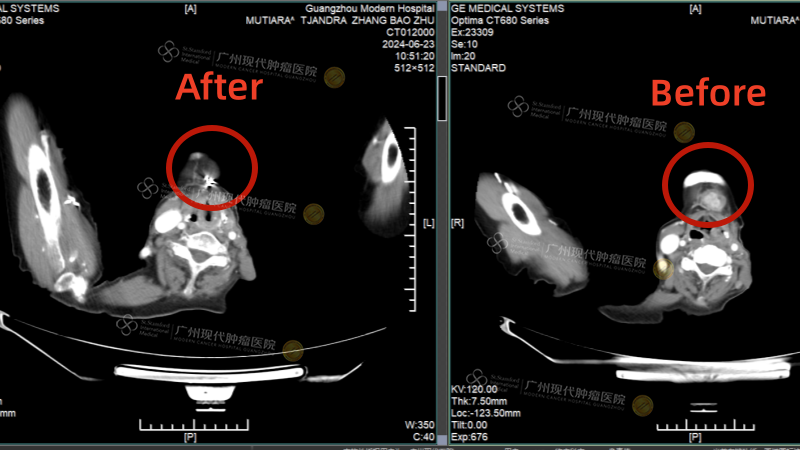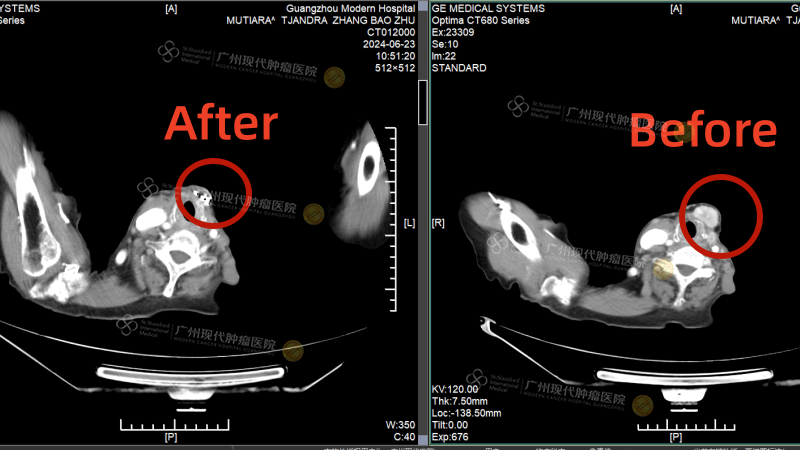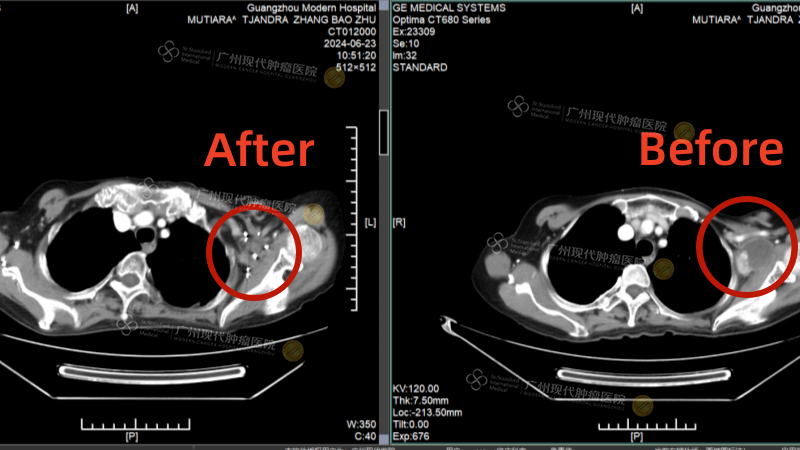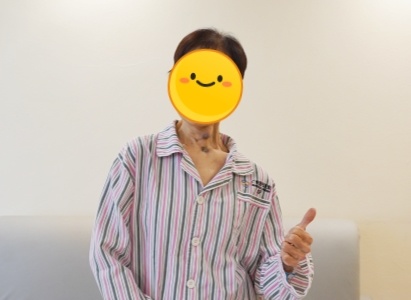 Views:144
Views:144 2024-10-30
2024-10-30 Share
Share

Mutiara
The situation was fraught with twists and turns, and the elderly woman underwent three surgical resections.
In 2010, Mutiara was 67 years old when she noticed an abnormal enlargement of the thyroid gland in her neck. The swelling became visibly apparent over time. After being diagnosed at Jakarta Hospital, she underwent a total thyroidectomy and received I-131 treatment post-surgery. She also took medication regularly to prevent recurrence. However, she did not have a biopsy at that time, leaving her uncertain whether she had a goiter or cancer. Seven years after this treatment, Mutiara's health appeared stable. Just when she believed she was cured, her condition deteriorated again.
In 2017, the lymph nodes on the left side of her neck began to swell, prompting her to seek treatment in Singapore. Before the treatment, the lump had grown to the size of an egg. In Singapore, Mutiara underwent a left neck lymph node dissection, and the postoperative pathological examination revealed that she had metastatic papillary thyroid cancer.
The disease did not treat this 74-year-old woman kindly. One year after the operation, Mutiara's cancer relapsed. Without hesitation, she hurried back to Singapore, but the doctor's response infuriated her. It turned out that during the last treatment, the physician responsible for the examination discovered a small tumor in the carotid artery. However, the surgeon who performed the removal was reluctant to address it without informing Mutiara, fearing the risk of damaging the artery, which ultimately led to the recurrence.
Faced with the two doctors' evasiveness, Mutiara was understandably upset and rejected their proposal for another surgical removal. Lacking a better alternative, she had no choice but to let the disease progress. By 2020, as her condition worsened, she developed three lumps behind her ears and on the left side of her neck. In Jakarta, she underwent a third surgical resection. Postoperative pathology revealed papillary thyroid carcinoma with cervical lymph node metastasis.
Survive against the odds—Come to St. Stamford Modern Cancer Hospital Guangzhou.
In 2021, Mutiara experienced symptoms of swollen lymph nodes in her neck once again. She had endured this recurring illness for over ten years, becoming accustomed to it and choosing to ignore it for the next three years. However, at the beginning of 2024, her condition worsened significantly, prompting her to seek treatment from the doctor who had performed her third surgery. After examining her, the doctor didn’t dare to remove her lesions. His words left Mutiara feeling hopeless as if she were standing at a crossroads, uncertain of which path to take.

Tiny seeds show significant efficacy, and the condition is improving
On February 23, 2024, 81-year-old Mutiara arrived at St. Stamford Modern Cancer Hospital Guangzhou for the first time, accompanied by her family. Upon admission, Mutiara underwent a comprehensive examination. A neck and chest enhanced CT scan revealed heterogeneous tumors in both the left and right thyroid beds following her thyroidectomy, measuring a total of 42 x 38 x 34 mm. Additionally, multiple new lymph nodes were identified in the lower neck. Considering her clinical condition, these findings are consistent with a recurrence of a malignant thyroid tumor and multiple metastases in both sides of the neck, the left clavicle, and the left axilla. The MDT noted that the patient had heart stents and grade 3 hypertension, and subsequently developed a treatment plan involving radioactive seed implantation for the lymph node metastases after thorough evaluation.
Seed implantation therapy involves the implantation of I-125 particles into tumors or tumor-infiltrated tissues. This method continuously releases gamma rays, offering several advantages, including minimal trauma, high safety, good sustainability, no damage to surrounding healthy tissues, and a broad range of indications. It is particularly suitable for patients with metastatic tumor lesions who are not candidates for surgery, have experienced postoperative recurrence, or are intolerant to conventional radiotherapy and chemotherapy.
On March 6, 2024, Mutiara underwent her first particle implantation treatment. According to her, she did not experience any discomfort during the procedure. In fact, the stiff neck she had the day before the operation was more bothersome. There were no side effects following the procedure, and her daily life remained unaffected. Mutiara was discharged from the hospital and returned home three days after the treatment. On April 18, 2024, she returned to the hospital for a follow-up examination. A CT scan revealed that the tumor lesions in the area where the particles were implanted had decreased in size, and her condition was stable. This interview marked Mutiara's third hospitalization, during which her condition continued to improve. The CT contrast indicated that the tumor lesions had significantly reduced.



CT comparison before and after treatment of Mutiara
Facing cancer, Mutiara maintains a positive mindset. This 81-year-old grandmother, who humorously refers to herself as 18, believes that feeling sad and upset when facing illness is unproductive. She emphasizes that the most important thing is to seek treatment promptly. In Jakarta, she frequently inspires her friends by sharing her personal experiences. Now, she expresses her desire to live a good life!


 (MY)+60 10-898 8919
(MY)+60 10-898 8919



























